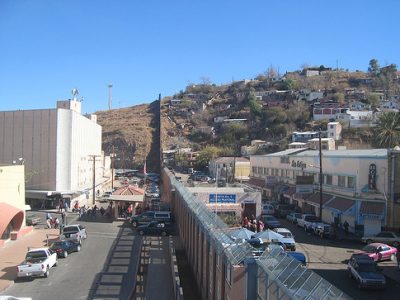Immigration at the Border

New Orleans Immigrants Weather the Storm
The response of New Orleans' immigrants to Hurricane Gustav is just another gross example of how attrition through enforcement doesn't work. A growing number of immigration raids, arrests and deportations are driving immigrants deeper into the shadows--even if it means ignoring evacuation orders and braving a deadly tropical storm. Immigration and Customs Enforcement (ICE) released a statement saying that it wouldn't be conducting any immigration enforcement activities in conjunction with Hurricane Gustav evacuation procedures, but many immigrants were either unconvinced or unaware of ICE's notice. Advocates said there was not enough time to prepare immigrant communities once the DHS press releases were issued. "We didn't have enough people to go into the neighborhoods where we know Latinos are living," Lucas Diaz told the Agence France-Presse. Many illegal immigrants became wary when they realized they would be asked to register at evacuation points for tracking purposes. "The government didn't give people assurances that they would be returned to New Orleans" and not deported," Jacinta Gonzalez, a day labor organizer with the New Orleans Workers Center for Racial Justice, said. "Just sending out press releases the day before the evacuation isn't going to work." Read More

DNC Live: NDN Immigration Forum Resumes with Frank Sharry
Frank Sharry, Executive Director of America's Voice was the third speaker featured at NDN's Immigration Reform and the Next Administration forum event. Sharry began by providing a definition for attrition through enforcement: From the policy point of view, attrition through enforcement assumes we have good laws and bad people and what we have to do is enforce the good laws so that the bad people go away. The idea is to make life so miserable so people will leave. He referred to it as more accurately being a form of "non-violent ethnic cleansing"--making a bad problem worse. Read More

DNC Live: Marco Lopez Continues NDN Immigration Discussion
The next speaker at the NDN's Immigration Reform and the Next Administration forum event at the DNC was Marco Lopez of Arizona, a rising star in American politics. Lopez talked about what Arizona has had to do "creatively" to tackle the growing trend of migration from South to North, acknowledging that Arizona--as one of the fastest growing states--needs workers. Read More

Phoenix Mayor Demands Immigration Reform at Police Conference
This week the Police Foundation sponsored a two day conference, “The Role of Local Police: Striking a balance between immigration enforcement and civil liberties." One of the highlights was a speech by Mayor Phil Gordon of Phoenix, a vocal supporter of immigration reform and opponent of the antics of Sheriff Joe Arpaio in Maricopa County. Gordon understands firsthand both the impact that undocumented immigration has had on his community and the impact that using the wrong policies to try to fix a very real problem have had. Drop houses, kidnapping operations, smuggling, and trafficking are all issues the Phoenix has to deal with on a daily basis, and they are direct results of the illegality wrought by the current broken immigration system. He also spoke about costs of enforcing immigration law -- the financial costs, the public safety costs, and the human costs. Read More

It’s the Economy Stupid
NOTE: This story first appeared on The Huffington Post. Last week, Immigration and Customs Enforcement (ICE) announced its latest gimmick -- Operation Scheduled Departure, a pilot program of voluntary deportation with no precedent, no incentives, and essentially no sensible basis. Meanwhile, on Wednesday the Center for Immigration Studies (CIS), a "think tank" that has been referred to as a "thinly disguised anti-immigration organization," published a highly contested study claiming that severe enforcement measures are driving down the US' "likely undocumented" immigrant population. Yet while ICE runs in circles, rounding up undocumented workers as CIS pats them on the back, the government fails to recognize that undocumented immigration is based more on the economics of survival than the politics of immigration enforcement--a costly misjudgment. Read More

What Happens When Local Cops Become Immigration Agents?
Over the past year and a half, County Sheriff Joe Arpaio of the Maricopa County Sheriff’s Office (MCSO) has transformed his police department into an immigration-enforcement agency, gaining international notoriety in the process. The East Valley Tribune of metro-Phoenix, Arizona, recently ran a series of articles chronicling its investigation of the immigration-enforcement activities of MCSO. Using MCSO case files, interviews with top-ranking officers, and other sources of data, reporters uncovered startling facts about the enormous price tag—both financial and social—of the Sheriff’s antics. Read More

Balancing Federal, State, and Local Priorities in Police-Immigrant Relations
Since the terrorist attacks of September 11, 2001, changes in federal, state, and local law-enforcement priorities and practices have had a profound impact on America’s Muslims, Arabs, and South Asians. Some of these policy shifts applied exclusively or primarily to those communities, such as the federal “special registration” program, selective enforcement of immigration laws based on national origin or religion, and expanded federal counter-terrorism efforts that targeted these communities. At the same time, a wide range of ethnic groups have been affected by the use of state and local police agencies to enforce federal immigration law, and the aggressive use of detention and deportation authority for even minor infractions and technicalities. Across the United States, police departments and Muslim, Arab, and South Asian communities have responded with varied approaches to the new post-September 11 reality. In some cities, serious tensions between law-enforcement agencies and immigrant communities have arisen. Other cities have taken steps to alleviate these tensions and promote dialogue and cooperation with immigrant communities. This report evaluates the challenges and successes of recent trust-building efforts between immigrant communities and local police departments, and the responses of each to new and proposed policies that threaten those efforts. Using the experiences of Muslim, Arab, and South Asian communities, the report offers insights that apply to much broader populations. It draws attention to best practices and policy solutions such as the creation of more effective channels for public dialogue and communication, public education campaigns, officer training and recruiting programs, and forms of cooperation between police and community organizations. Read More

Money for Nothing: Immigration Enforcement without Immigration Reform Doesn’t Work
While the U.S. government has poured billions upon billions of dollars into immigration enforcement, the number of undocumented immigrants in the United States has increased dramatically. Rather than reducing undocumented immigration, this enforcement-without-reform strategy has diverted the resources and attention of federal authorities to the pursuit of undocumented immigrants who are drawn here by the labor needs of our own economy. Read More

The Politics of Contradiction: Immigration Enforcement vs. Economic Integration
Since the mid-1980s, the federal government has tried repeatedly, without success, to stem the flow of undocumented immigrants to the United States with immigration-enforcement initiatives: deploying more agents, fences, flood lights, aircraft, cameras, and sensors along the southwest border with Mexico; increasing the number of worksite raids and arrests conducted throughout the country; expanding detention facilities to accommodate the hundreds of thousands of undocumented immigrants apprehended each year; and creating new bureaucratic procedures to expedite the return of detained immigrants to their home countries. At the same time, the economic integration of North America, the western hemisphere, and the world has accelerated, facilitating the rapid movement of goods, services, capital, information, and people across international borders. Moreover, the U.S. economy demands more workers at both the high-skilled and less-skilled ends of the occupational spectrum than the rapidly aging, native-born population provides. The U.S. government’s enforcement-without-reform approach to undocumented immigration has created an unsustainable contradiction between U.S. immigration policy and the U.S. economy. So far, the economy is winning. Read More

The Social Security Administration No-Match Program: Inefficient, Ineffective, and Costly
This report provides an overview of SSA’s no-match letter program, a summary of DHS’s new supplemental proposed rule regarding no-match letters, and an overview of the unintended consequences of no-match letters that are sent to employers. Read More
Make a contribution
Make a direct impact on the lives of immigrants.
